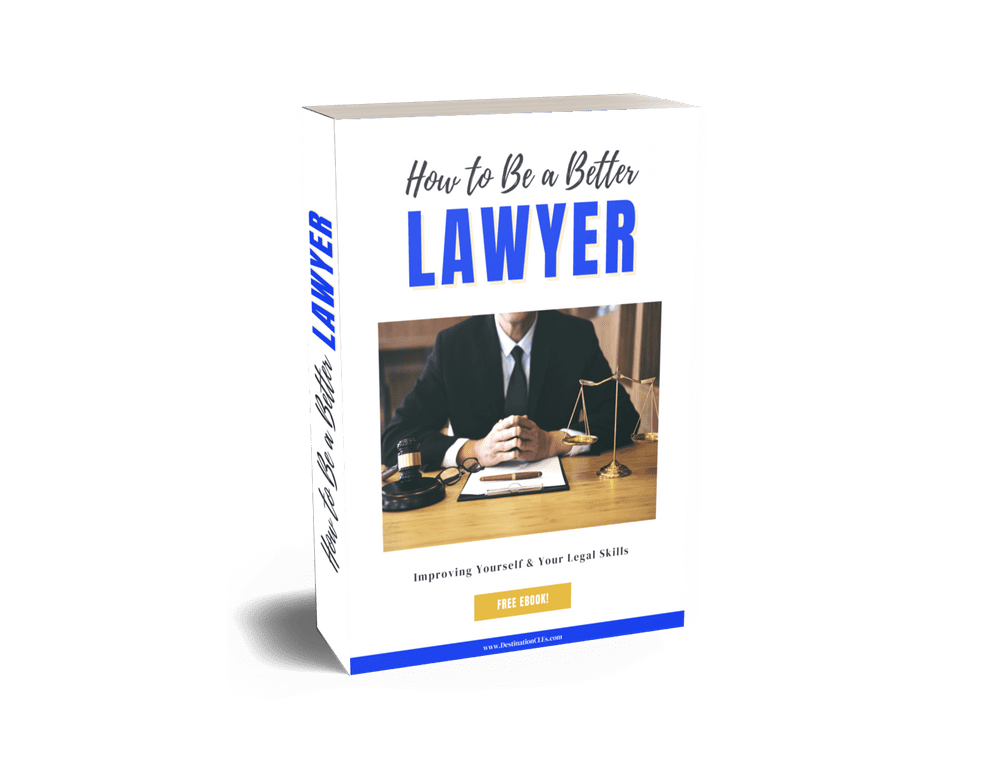In the high-pressure world of law, mindfulness is becoming increasingly important as a means to manage stress and maintain mental well-being. This article will look at the advantages of mindfulness for attorneys, including enhanced mental health, better concentration and productivity, and successful stress relief.
We’ll also explore practical ways legal professionals can easily incorporate the practice of mindfulness and meditation into their daily routines. Plus, we’ll provide valuable resources such as online courses and tutorials specifically designed for lawyers who are interested in developing a mindful response to the demands of their law practice.
By prioritizing self-care and reflection alongside career success, attorneys can achieve a balanced lifestyle that supports both personal growth and professional excellence.
Positive Benefits of Mindfulness for Attorneys
As a lawyer, we know you understand the stressful situations that accompany your legal practice. Balancing demanding workloads, meeting tight deadlines, and managing clients’ problems can take a toll on your mental health. Thankfully, mindfulness is an effective way to enhance and balance the various facets of life as an attorney.
Here are a few benefits of this practice:
Improved Mental Health
Mindfulness involves paying attention to the present moment without judgment or distraction. By practicing mindfulness regularly, attorneys can experience improved mental health, including lower levels of stress and fewer depression symptoms. Of course, a clear mind allows lawyers to better handle their emotions during high-stress situations like court hearings or negotiations.
Increased Focus and Productivity
By engaging in mindful practices, lawyers can train their brains to stay focused on one task at a time instead of multitasking, thereby enhancing their cognitive abilities and decision-making capacity. As a result, attorneys who practice mindfulness are likely to see improvements in their overall productivity levels at work.
For example, mindful meditation has been shown to increase cognitive function, which translates into better decision-making skills for legal professionals. Here’s a few ways attorneys can incorporate this into their daily lives:
- Meditation: Take short breaks throughout the day for deep breathing exercises or guided meditations using apps like Headspace or Calm.
- Focused Attention: Set aside specific times each day when you will consciously avoid distractions (like checking your mobile device for emails or social media) while working on important tasks.
- Mindful Eating: Pay attention to the taste, texture, and aroma of your food during meals instead of eating mindlessly at your desk.
Stress Reduction
Naturally, the legal profession is known for its high-stress environment. It’s also no secret that chronic stress can lead to burnout, negatively affecting both personal life and professional performance. Mindfulness practices have been proven effective in reducing stress levels, allowing attorneys to better manage their workload while maintaining a healthy work-life balance.
Incorporating mindfulness into your daily routine as an attorney not only benefits you personally, but also has a positive change on your career growth. With this in mind, consider attending an Eduvacation℠ getaway with Destination CLEs, where you can earn CLE credits while enjoying relaxation and networking opportunities with other like-minded professionals in beautiful locations around the world.
In short, mindfulness is an invaluable tool for attorneys that can provide a significant impact, from improved mental health to increased focus and productivity. With proper practice, these skills can be honed to maximize their potential and benefit both professional and personal relationships. Now, let’s explore some ways attorneys can implement mindfulness in their daily habits.
Related: 15 Easy Self Care Tips for Lawyers

Practicing Mindfulness as an Attorney
Incorporating mindfulness into your daily routine can be a game-changer for attorneys, helping you to maintain balance and focus in both your professional and personal life. In this section, we’ll discuss how attorneys can make mindfulness part of their daily lives by exploring meditation techniques, setting boundaries for self-care, and creating time for reflection and relaxation.
Incorporating Meditation Practice into Your Routine
Meditation is a powerful tool that can help attorneys improve their concentration levels while reducing stress and anxiety. One popular form of meditation suitable for busy professionals is mindfulness meditation, which involves focusing on the present moment without judgment or distraction.
If you’re new to meditation, here are some tips to get you started:
- Start small: Begin with just five minutes (or less) per day of focused breathing exercises or guided meditations from apps like Calm or Headspace.
- Create a habit: Schedule regular meditation sessions at specific times during the day (e.g., before work or after lunch) to make it easier to stick with your new routine.
- Vary your approach: Experiment with different types of meditation practices such as loving-kindness (metta), body scan, or walking meditations to find what works best for you.
Setting Boundaries and Prioritizing Self-Care
To achieve greater well-being in both their careers and personal lives, lawyers must set aside time to prioritize self-care by setting healthy boundaries between work-related tasks and leisure activities.
Here are some tips on how to do this:
- Establish work-life balance: Set clear boundaries between your professional and personal life by designating specific times for work-related tasks, family time, hobbies, and relaxation.
- Learn to say no: Recognize that it’s okay to decline additional responsibilities or commitments when you’re already overwhelmed. Looking after one’s psychological well-being is essential for achieving enduring success in the legal field.
- Prioritize self-care activities: Make a list of activities that help you recharge (e.g., exercise, reading, social isolation) and schedule them into your daily routine as non-negotiable appointments with yourself.
Making Time for Reflection and Relaxation
Taking regular breaks throughout the day can improve focus, creativity, and overall well-being.
Here are some suggestions on how attorneys can make time for reflection and relaxation during their busy schedules:
- Schedule mini-breaks: Allocate short periods of downtime throughout the day – even just five minutes – to step away from screens or engage in mindfulness exercises such as deep breathing or visualization techniques.
- Create a calming environment at work: Personalize your workspace with soothing elements like plants or artwork that promote tranquility. Consider using noise-cancelling headphones if necessary to block out distractions while working on important tasks.
- Incorporate physical activity into your routine: Aim for at least thirty minutes of moderate-intensity exercise each day—whether it’s walking during lunch breaks or attending fitness classes after work—to help reduce stress levels while promoting overall physical health and wellness.
Again, an excellent way to combine mindfulness practice with career development is through an Eduvacation℠ getaway with Destination CLEs. By attending Continuing Legal Education conferences while on a relaxing vacation, attorneys can earn their CLE credits while also enjoying a much-needed break from the hustle and bustle of daily life. Learn more about Destination CLEs and how we can help you further your legal career while prioritizing mindfulness.
To summarize, mindfulness is an invaluable practice for attorneys, as it helps to foster clarity and focus in the midst of a busy work schedule. With the right resources, lawyers can easily incorporate mindfulness into their daily lives and reap its many benefits. Next, let’s explore some great options available to help mindful attorneys deepen their practice.
Related: Stress Management for Lawyers: 4 Ways to Deal with Legal Stress

Resources for Mindful Attorneys
As an attorney, you may be questioning how to initiate incorporating mindfulness into your regular routine and career. Fortunately, there are plenty of resources available that cater specifically to lawyers looking to embrace mindfulness practices. In this section, we’ll explore some online courses and tutorials, books on mindfulness for lawyers, and support groups and communities that can help you become a more mindful attorney.
Online Courses and Tutorials
First, there are numerous online platforms offering courses tailored specifically for attorneys seeking to learn about mindfulness techniques. These courses often provide practical guidance on meditation practices as well as tips on how to integrate them into your busy schedule effectively.
Some popular options include:
- Lawyers with Purpose: This platform offers various programs designed exclusively for legal professionals focusing on personal growth, stress management, time management skills development.
- The Anxious Lawyer: This website was created by an attorney who literally wrote the book on lawyer anxiety. Jeena Cho has experienced the most important benefits of mindfulness firsthand and she uses this website to provide mindful resources for attorneys along with articles and podcast episodes discussing different aspects of mental health in the legal profession.
- The Conscious Lawyer: This website & magazine provides a wealth of resources, including articles, interviews, and podcasts, all aimed at helping legal professionals prioritize their mental health and wellbeing. From tips on managing stress to strategies for building resilience, The Conscious Lawyer is a valuable tool for attorneys seeking to lead a more balanced and fulfilling life.
Books on Mindfulness for Lawyers
If you prefer learning through reading or want additional resources alongside online courses, there are several books available that focus on mindfulness specifically for attorneys. Some of the most popular titles include:
- The Six-Minute Solution: A Mindfulness Primer for Lawyers by Scott L. Rogers: This book provides practical guidance and insights into how mindfulness can help lawyers enhance their professional lives.
- Stress Reduction for Lawyers, Law Students, and Legal Professionals: Learning to Relax by Stephen Snyder: This book offers valuable insights and techniques for managing the challenges that come with a legal career. With a focus on mindfulness and relaxation, this book provides practical tools for reducing stress and building resilience in the face of difficult situations.
Support Groups and Communities
Beyond online resources and books on mindfulness practices tailored to lawyers’ needs, joining support groups and communities dedicated to the same cause can provide additional benefits such as networking opportunities, peer encouragement, accountability, and group learning experiences. Some options to consider include:
- Mindful Law Group: An organization offering workshops, retreats, webinars, and other events designed to promote greater awareness, compassion, and resilience among members of the legal community through contemplative practices.
- The Mindful Law Student: While primarily focused on students in law school, this book and accompanying website also offer resources applicable to practicing attorneys looking to incorporate meditation and self-care strategies into their daily lives.
Frequently Asked Questions About Mindfulness for Attorneys
Can practicing mindfulness improve lawyer decision making, ethics, and leadership?
Yes, practicing mindfulness can enhance decision-making abilities, ethical behavior, and leadership skills in lawyers. Mindfulness helps attorneys develop greater self-awareness, emotional intelligence, and empathy towards clients and colleagues while reducing stress levels. This results in better judgment calls and more effective communication within the legal profession.
What is mindfulness in law?
Mindfulness in law refers to the application of mindfulness techniques like meditation or conscious awareness practices to help lawyers manage stress effectively while improving focus on their work. It emphasizes being present with non-judgmental attention to thoughts and emotions that arise during professional responsibilities.
What are lawyers most stressed about?
Lawyers often experience high levels of stress due to factors such as heavy workload demands, tight deadlines, adversarial nature of litigation processes, client expectations, maintaining a work-life balance, billing pressures, competition for career advancement opportunities, and ethical dilemmas.
What are the three major benefits of practicing mindfulness?
The three major benefits of practicing mindfulness include 1) Improved mental health, which leads to reduced anxiety, depression, and burnout; 2) Increased focus and productivity by enhancing cognitive abilities such as attention control, memory retention, and problem-solving skills; 3) Stress reduction through better emotional regulation and resilience.
Related: The Best Estate Planning Software for Attorneys
Conclusion
Mindfulness for attorneys is an important regular practice to incorporate into the unique challenges of your legal career. Practicing mindfulness as a lawyer can be invaluable for keeping focused and efficient, but it also enables you to take a break from the tension of everyday life in order to gain insight and lucidity.
Also, with Eduvacation℠ packages from Destination CLEs, lawyers have the perfect opportunity to combine their continuing education with some much-needed relaxation while networking with other professionals in their field.
In the end, it’s important to make sure that mindfulness is part of your routine as an attorney so that you’re able to make better decisions and achieve greater success while also taking care of your mind, body, and spirit.
Related:
- 15 Easy Self Care Tips for Lawyers
- Stress Management for Lawyers: 4 Ways to Deal with Legal Stress
- The Best Estate Planning Software for Attorneys





